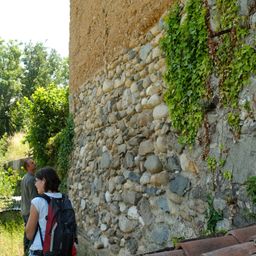
Sessions in which Léa Génis participates
Monday 6 June, 2016
Sessions in which Léa Génis attends
Friday 3 June, 2016
This forum will explore the current directions of critical heritage studies and what makes ACHS distinctive. Panel members will discuss what the term critical means to them, and what directions they would like to see develop in the future. To help develop an open dialogue, the session will also give considerable time to contributions from the audience.
Welcome addresses and cocktail, followed by the Concordia Signature Event "The Garden of the Grey Nuns". As the opening ceremony and cocktail take place in the former Grey Nuns' Motherhouse, recycled into campus residence and reading rooms by Concordia University, delegates will also have the possibility to discover the video Three Grey Nuns (3 minutes, by Ron Rudin and Phil Lichti. Three Grey Nuns recount their memories of communal life in the Grey Nun’s Motherhouse. Built...
Saturday 4 June, 2016
What if we changed our views on heritage? And if heritage has already changed? While, on the global scene, states maintain their leading role in the mobilization of social and territorial histories, on the local scale, regions, neighbourhoods and parishes have changed. Citizens and communities too: they latch on to heritage to express an unprecedented range of belongings that no law seems to be able to take measures to contain, often to the discontent of...
Essentiellement construite sur des questions d’aménagement et d’environnement, urbain ou non, cette session est envisagée à la croisée de plusieurs thématiques: les «communautés imaginaires», les usages du patrimoine dans le tourisme, le rapport à l’expertise. Nous proposons de décrire et d’organiser un faisceau de situations et d’exemples, qui ressortissent à une même hypothèse sur le caractère social, la nature de bien collectif et le rôle de catalyseur des transformations joué par le pa...
In recent decades, the growth of the World Heritage industry has necessitated the reconsideration of scale. Formerly dominated by nation-states, some influential international organizations such as UNESCO and its advisory bodies (ICOMOS and IUCN) are now taking a strong role in decision-making through policy-making and implementation. Despite the power of the transnational organization and its relation with states parties, there is a growth of regionalism and “localism” in the heritage indust...
This festive event will offer delegates a taste of one of the iconic dishes of Montreal, the smoked meat sandwich, imported by Jewish immigration from Eastern Europe in the early 20th century. In particular, the tasting will allow a discovery of the products of the renowned international institution Schwartz's, the Hebrew Delicatessen for which Montrealers and tourists alike are willing to wait in long line-ups. During the tasting, “Chez Schwartz,” a documentary produced by Garry B...
Most of what we experience as heritage emerges into conscious recognition through a complex mixture of political and ideological filters, including nationalism. In these processes, through a variety of devices (museums, scholarly research, consumer reproduction, etc.), dualistic classifications articulate a powerful hierarchy of value and significance. In particular, the tangible-intangible pair, given legitimacy by such international bodies as UNESCO, reproduces a selective ordering of cul...
Sunday 5 June, 2016
In English and French The two Inuit artists Nina Segalowitz and Taqralik Partridge are offering us an initiation to katajjaniq, this thousand years old autochthonous expression of overtone singing which consists of an alternate dialogue of inhaled and exhaled guttural and vocal sounds. Throat singing is practiced just like a game: two women facing and challenging one another until one of them either laughs or runs out of breath. (Meeting point: DS Registration table) _...
With his expression "ceci tuera cela," Hugo established almost two centuries ago a strong link between words and stones as transmission vehicles of human memory. We heritage experts would be inclined to consider stones as more reliable than words, what semiology seems to confirm: stones are clues, and clues are, according to Roland Barthes, tangible proofs of “what has been.” But the inspector Columbo has often shown how we can play with these clues, and Umberto Eco would easily forgive us th...
Directed by Tom Fassaert and presented by Marc Jacobs. ___ Doel, a Belgian village near the Dutch border, is disappearing quickly and deliberately. Not because of the four old nuclear reactors on its territory, but because the Flemish government decided that the village might block projects for new docks for the Antwerp harbour, plans developed since the 1960s. In the 21st century this process of officially encouraged depopulation is coming to an end: 2500 inhabitants i...
Tuesday 7 June, 2016
Si la ville moderne occidentale se transforme, sous l'action des aménageurs, en écho à des utopies, des programmes de développement et des intérêts économiques, on néglige trop souvent l'action quotidienne d'habitants et d'acteurs sociaux qui s'approprient les lieux et contribuent à les transformer. Dans cette mutation de la ville, le patrimoine se trouve à la croisée d'enjeux économiques et sociaux singuliers: d'une part il est convoqué par les aménageurs et les acteurs de la gentrification ...
The second half of the 20th century saw the affirmation of national and international heritage administrations run by teams of experts that mutually validated each other’s knowledge and findings. The emergence of new forms of heritage, new collections and international networks related to museums, or other heritage structures, has led to the development of numerous new or reformulated specialities. In the last two decades a new ideal of heritage has gained ground, one based on communities ...




